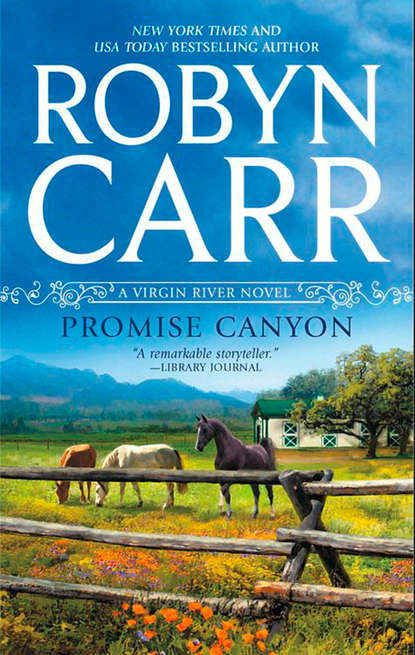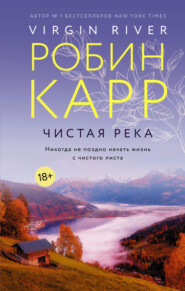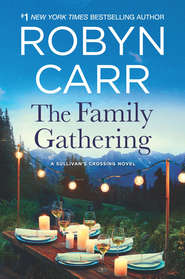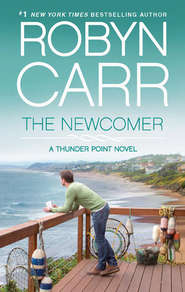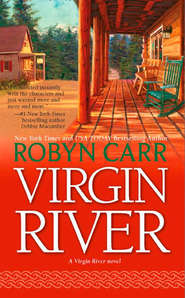По всем вопросам обращайтесь на: info@litportal.ru
(©) 2003-2024.
✖
Promise Canyon
Автор
Год написания книги
2019
Настройки чтения
Размер шрифта
Высота строк
Поля
with my deepest affection and gratitude.
Acknowledgments
I’m deeply grateful for the dedicated assistance given to me by Scott Lampert, all-around horse expert, farrier and creator of www.ONTRACKEQUINE.com, a sophisticated program used by horse professionals, owners and breeders to assure peak equine performance. This story could not have been told without your help.
Special thanks to Sean Vasquez, Native American musician and actor. Through your eyes I could better envision the Native American characters in this story.
For this story as for almost every story I write, special thanks to Michelle Mazzanti for early reading and research assistance. I just couldn’t get to the end of a book without your input and help.
I am indebted to Kate Bandy and Sharon Lampert. Without your continual loyalty and support I would be lost.
My heartfelt gratitude to Ing Cruz for creating and managing Jack’s Bar online, where hundreds of Virgin River readers exchange book news. (http://groups.yahoo.com/ group/RobynCarr_Chatgroup/)
Thanks to Rebecca Keene for early readings of this and many manuscripts; her feedback is incredibly valuable.
Thanks to everyone at the Nancy Berland Public Relations Agency for the support and for always watching my back. Jeanne Devon of NBPR, thanks for the hours of reading and critiquing—your feedback is a tremendous help.
And as always, thank you to Liza Dawson of Liza Dawson Associates and to Valerie Gray, editorial director of MIRA Books, two of the toughest readers in publishing. Thank you both for being relentless, tireless, devoted perfectionists. Every push makes each book a little better and I owe you. This is always a team effort and I couldn’t have a better team!
One
Clay Tahoma headed into the mountains of Humboldt County, Northern California, along Highway 36, a narrow road that had lots of sharp turns along the way. According to his GPS the next left would lead him to a town called Virgin River. It appeared to be the nearest town to his destination, the Jensen Veterinary Clinic and Stables, and he wanted to check it out. He was nearing the turnoff when he noticed something up ahead—some pickups parked at the side of the road.
He slowed down and pulled over, curious to see what was going on. He got out of his truck and walked past a number of vehicles toward a large flatbed truck. There were men standing around watching as a forklift with a large cable attached pulled away from the edge of the road. Clay approached one of the men. He was as tall as Clay and wore a plaid shirt, jeans, boots and ball cap. “Whatcha got, friend?” Clay asked.
“One of our town slipped off the road and got stuck—luckily came up against a big tree not too far down the hill. That’s how he managed to get out and climb back up.”
“Who’s pulling him out?” Clay asked.
“Aw, one of our boys has a lot of construction equipment. He’s a contractor up this way.” The man put out his big hand. “Jack Sheridan. You from around here?”
“Name’s Clay Tahoma, originally from Flagstaff and the Navajo Nation. Lately from L.A. I’m up here to work with an old friend, Nathaniel Jensen.”
Jack’s face took light at that. “Nate’s a friend of mine, too! Pleasure to meet you.”
Jack introduced Clay to some other men who were standing around—a guy named John, who they called Preacher; Paul, who owned the flatbed and forklift; Dan Brady, who was Paul’s foreman; and Noah, the minister whose truck slipped off the road. Noah smiled sheepishly as he shook Clay’s hand. No one seemed to react to the sight of a Native American with a ponytail that reached past his waist and an eagle feather in his hat. And right at that moment Noah’s old blue Ford truck began to clear the edge of the road.
“Don’t you guys have a Highway Department or Fire Department you could call to do this?” Clay asked.
“If we had all day,” Jack said. “We tend to take care of ourselves out here. But the big problem is that weak shoulder. Highway Department reinforces it every time we have a slide, but what we really need is something more permanent. A wider road and a guardrail. A long and strong guardrail. We’ve requested it, but this road doesn’t see a lot of travel so our request just gets ignored or denied.” He nodded toward the stretch of road he was talking about. “We had a school bus slide down that hill a couple of years ago. Minor injuries, but it could’a been horrible. Now I hold my breath every time there’s ice on the road.”
“What’s the holdup on the guardrail?”
He shrugged. “Real small population in an unincorporated town in a county in recession that has bigger challenges. Like I said, we get used to taking care of things the best we can.”
“There’s no ice in August,” Clay said. “What happened to the pastor?”
“Deer,” Noah said. “I came around the curve and there she was. I hardly swerved, but all you have to do is get a little too close to the edge and you’re toast. Ohhhh, my poor truck,” he said as the vehicle made it to the road.
“Doesn’t look any worse than it did, Noah,” Jack said.
“Seriously,” Preacher said, hands on his hips.
“What are you talking about?” Noah returned indignantly. “It’s got several new dents!”
“How can you tell?” Jack asked. “That old truck is one big dent!” Then he turned to Clay and said, “Go easy around these curves and tell Doc Jensen I said hello.”
Clay Tahoma drove his diesel truck up to the Jensen Veterinary Clinic and Stables. His truck pulled a large horse trailer that he’d filled with his personal belongings. Shutting off the engine, Clay jumped out of the truck and looked around. The clinic consisted of the veterinary office attached to a big barn, a nice-sized covered round pen for exams, several large pastures for the horses to exercise, the horses’ turnout and a couple of small paddocks for controlled, individual turnout. Horses can’t be turned out together unless they’re acquainted; they can get aggressive with each other.
Opposite the clinic, across what functioned as a parking area large enough for trucks and trailers, was a house built for a big family. The whole lot was surrounded by trees, full with their summer green, barely swaying in the early-August breeze.
He sniffed the air; he smelled hay, horses, dirt, flowers, contentment. There was honeysuckle nearby; his nose caught it. He got close to the ground, sitting on one boot heel, touching the dirt with his long, tan fingers. He was filled with a feeling of inner peace. This was a good place. A place with promise.
“Is that some old Navajo thing you’re doing there?”
Before he could rise Dr. Nathaniel Jensen was walking out of his veterinary office door, wiping his hands on a small blue towel.
Clay laughed and stood up. “Listening for cavalry,” he said.
“How was the drive?” Nate asked Clay, stuffing the towel in his pocket and stretching out a hand.
Clay took Nate’s hand in a hearty shake. “Long. Boring until I got closer—some guys from Virgin River were hauling a truck up a hill. The town minister slid off the road avoiding a deer. No injuries, just a lot of grumbling. How’s the building coming?”
“Excellent. I’ll get you something to drink, then take you on a tour.” Still shaking Clay’s hand, Nate clapped his other hand on his friend’s shoulder and said, “I’m really sorry about Isabel, Clay.”
Clay smiled with melancholy. “If we hadn’t divorced, I wouldn’t be here. Besides, not much has really changed between us, except that I moved out of L.A.”
“A divorce that hasn’t changed much?” Nate asked, tilting his head in question. “Never mind,” he said, shaking his head. “Don’t tell me. It might be more than I want to know.”
Clay laughed in good humor, though he wasn’t sure it was funny. He and Isabel weren’t right for each other, but that hadn’t stopped them from falling in love. They were nothing alike and had little in common beyond the equine industry—and even then they were on completely opposite ends of it. She was a rich horsewoman, a breeder and equestrienne of Swedish descent—a ravishing, delicious blonde who had grown up privileged—while he was a Navajo farrier and veterinary technician who had been raised on a reservation. They had been impossibly attracted to each other, had gotten married, and then encountered predictable problems with communication and lifestyle choices. There was also the resistance from her family, who probably thought he was marrying her money. When Isabel had suggested they divorce, Clay had known it was coming and didn’t argue. Divorce was for the best and he’d agreed to her terms, but they hadn’t stopped caring about each other. They hadn’t stopped sleeping together, either. But Isabel’s father probably slept better at night knowing his beautiful, wealthy daughter was no longer legally attached to a Navajo of simple means and some old tribal notions. And he hadn’t exactly been thrilled that Clay had a son prior to marrying Isabel. Gabe lived back on Navajo Nation with Clay’s parents and extended family, but he was still very much a part of Clay’s life and he knew Isabel’s family wasn’t too happy about that history.
Nate Jensen worked with Clay years ago in Los Angeles, long before Nate took over his father’s veterinary practice near Virgin River. It made sense that Nate would have called Clay to ask if he could recommend a good vet tech; Nate’s tech had retired after working first for Nate’s father and then himself.
“I can think of a number of excellent people,” Clay had replied. “But I’m looking for a change and I have family up that way. Any chance you’d consider me?”
Nate jumped on that; Clay was a much-sought-after tech and could function as a farrier, as well. And so here they were.
“I have tea and lemonade in the house,” Nate said. “Can I help you unload anything?”
“I think I’ll leave everything in the trailer for now,” Clay said. “You’re sure you don’t mind if I just use the tech’s overnight quarters?”
“It’s yours for as long as you want it. There are other options, of course. You’re welcome to share the house with me and Annie—it’s just the two of us and there’s lots of room. If you want something larger for yourself, we can help you find a house. It’s all up to you, my friend. I’m just so damn glad you’re here.”
Clay smiled warmly. “Thank you, Nathaniel. The tech’s quarters will be fine. Let’s test that lemonade and look around.”
“Dinner with us tonight, Clay?” he asked.
“It would be a privilege. I can’t imagine a woman who would be willing to marry you—I look forward to meeting her.”





